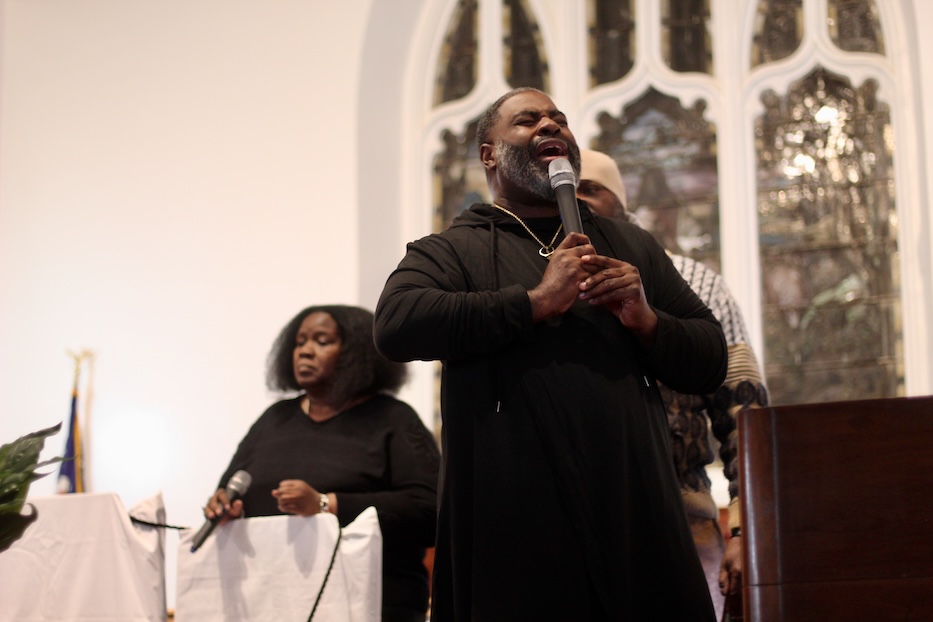
Culture & Community | Faith & Spirituality | Arts & Culture | Newhallville | News From The Pews | Public Health | Arts & Anti-racism
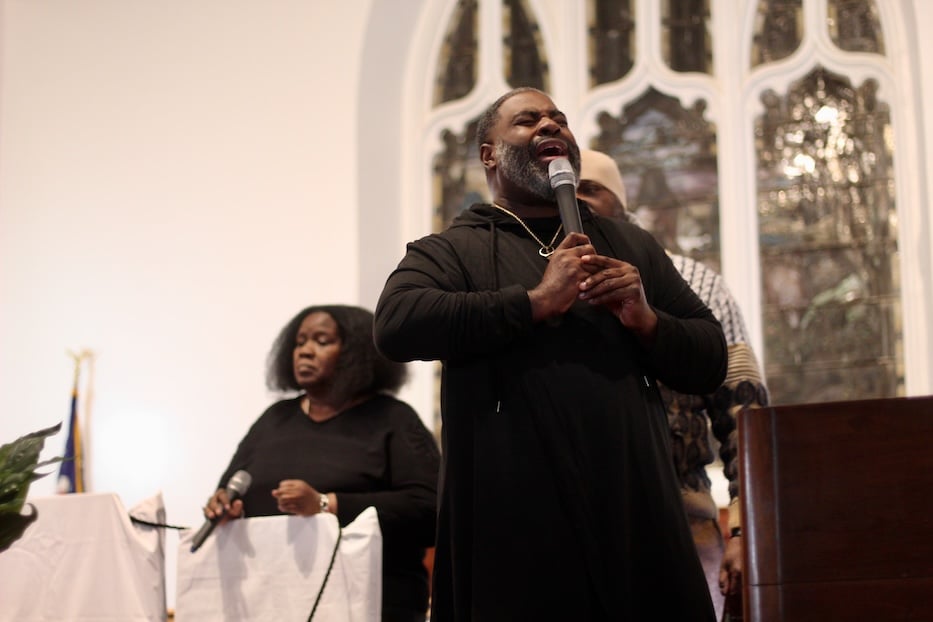
Pastor Sampson Denny, who is a faith leader in Stratford. Lucy Gellman Photos.
Pastor Sampson Denny’s voice filled St. Mary’s UFWB Church, rolling down the aisles. When you're weary/Feeling small/When tears are in your eyes/I'll dry them all. It pressed itself gently to the brick walls, hanging in the doorways with an echo. I'm on your side/Oh, when times get rough! In the cool, damp night, it undulated out onto Shelton Avenue, as clear as a bell. And friends just can't! Be! found!/Like a bridge over troubled water/I will lay me down. Back inside, there wasn’t a dry eye in the house.
Saturday evening, music, dance, rafter-raising praise and the gospel of public health converged at St. Mary’s on 266 Shelton Ave. for “The Healing Starts Here,” a commemoration of World AIDS Day from lifelong New Havener, artist, and advocate Andrea Daniels-Singleton and A2A Productions. Part memorial and part celebration, the event doubled as a form of grassroots activism, asking community members to spread the message of HIV awareness in their homes, schools, neighborhoods and houses of worship. Roughly four dozen attended.
“I feel it’s imperative to get the correct information out in our communities, dispelling the myths and sharing the facts,” said Daniels-Singleton, who has attended St. Mary’s since she was a baby, and sees the church as a way to disseminate vital information around HIV prevention and awareness. “My hope and desire is that we continue to grow, learn, prosper, and be in good health. Knowledge is power!”
Throughout the event, artists and speakers alike came back to that message, from musical and poetic interludes to a final benediction that closed the night in food, fellowship and free HIV testing. As they opened the evening, Bethel A.M.E.’s Visions of Praise dance troupe ushered it in, members gliding toward the front of the church in billowing black dresses.
No sooner had they begun to move to Tasha Cobbs Leonard’s “Put A Praise On It” than attendees were cheering from their pews, some moving along to the music. In front of the pulpit, April Smith and Karissa Kee-Conyers swayed to the music, their bodies fused with the sound. When dancer Khaili Dingle-King leapt into their arms, it was as though she had taken flight. The whole night seemed full of possibility.
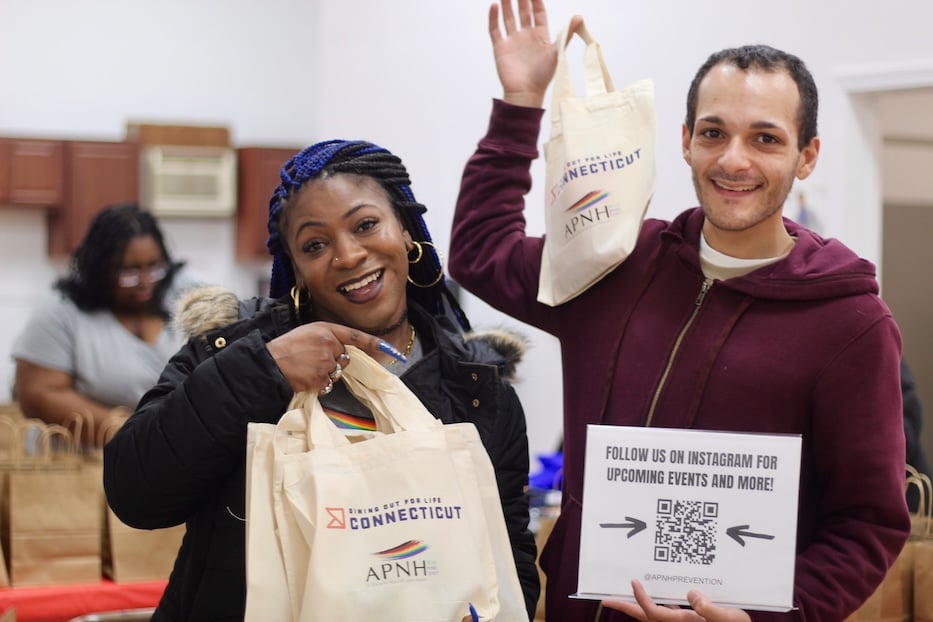
In the church’s back room, Tiny and Jordan Beall of A Place To Nourish Your Health (APNH, formerly AIDS Project New Haven) assembled neat cotton to-go bags with condoms, lubricant, rainbow-colored pins, keychain-sized pill holders, and information about the work that APNH does every day, including a forthcoming van for mobile testing. Nearby, they set up a station for free HIV testing, the results for which are ready in 20 minutes.
“We came to really provide people with knowledge of our services,” said Beall, a community HIV counselor and tester with the organization. For him, the work is personal: he learned about APNH through the organization’s visibility at clubs and gay bars, and now is part of the organization's work to stem the spread of HIV. “We really want to get the word out about what we do.”
“We just want to let everybody know we are here,” added Tiny.
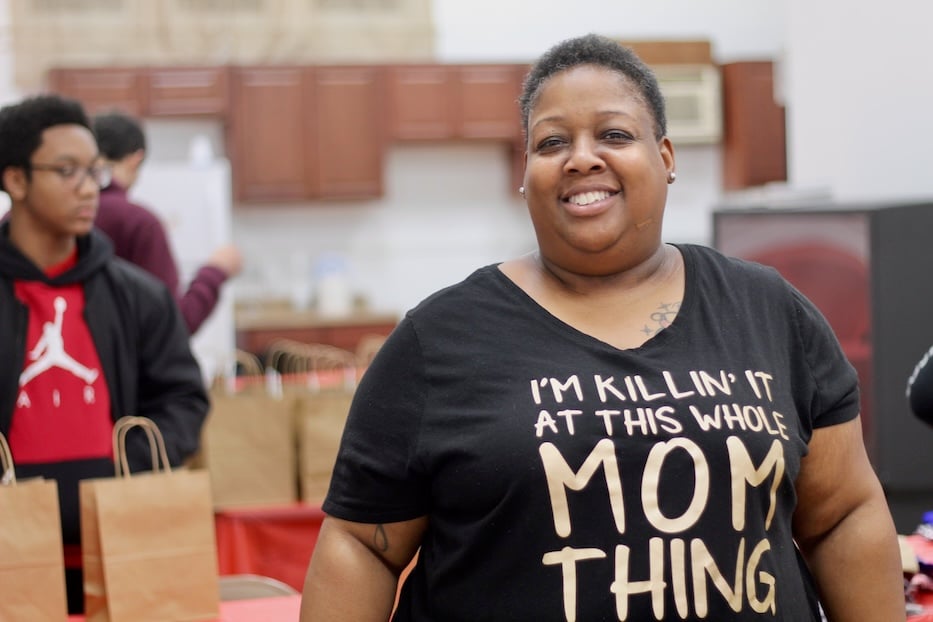
Nearby, attendee and volunteer Shatalla Stovall slipped the bags into winter warming packages with mittens, hats, scarves and gloves. Born and raised in New Haven, Stovall reflected on the weight HIV has had on her own life, from an uncle who passed several years ago to a sibling who is living with the virus, and managing it through an active approach to treatment.
“People just need to be knowledgeable, and they need to be aware,” she said. “For me, it’s just normal. I can appreciate people that are just living their healthy, normal lives.”
Back in the church, emcee Sean Hardy launched into the event with both prayer and a public health message, bringing attendees back to the cause around which they had gathered. Since 1988, December 1 has been recognized as World AIDS Day, a chance to honor those who have both lived with and died from the virus.
Three and a half decades later, it may no longer be a death sentence, but remains weighted with a stigma that has stymied both prevention work and the dissemination of correct information. In 2021, the Centers for Disease Control and Prevention (CDC) reported over 35,000 new diagnoses, many among young Black and Brown people.
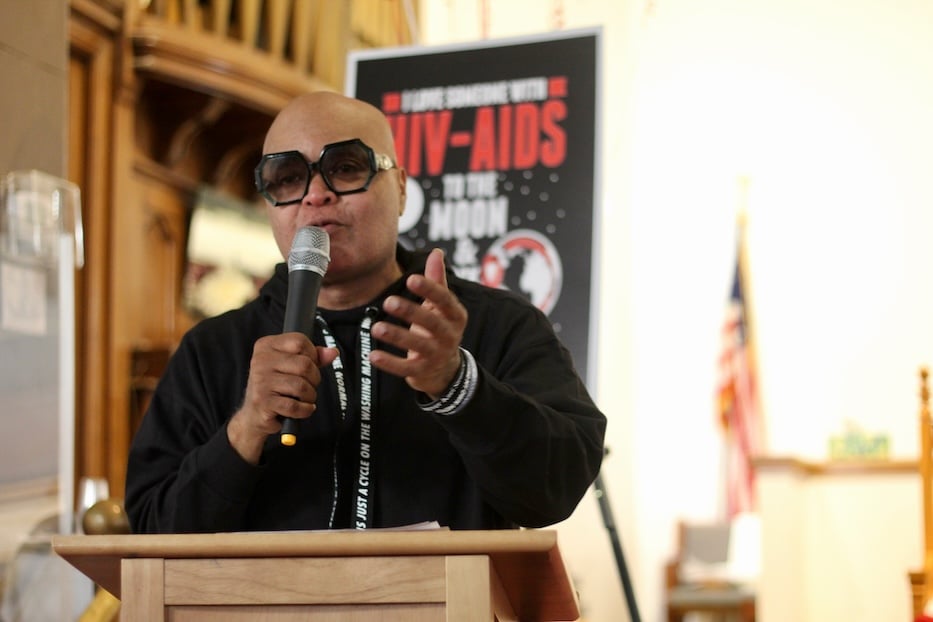
Emcee Sean Hardy.
“We are still in the land of the living, and that is a great blessing,” Hardy said. In the church’s pews, red and white balloons bobbed in place, as if they were nodding in agreement.
And throughout the night, it was. Following liturgical dance, that message flowed through an address from Dr. Onyema Obuagu, an associate professor of medicine and director of the Yale Antivirals and Vaccines Research Program at the Yale School of Medicine. Introducing himself as both a physician and a devoted Christian, Obuagu stressed the importance of talking openly about HIV and AIDS, including the fact that it is spread through sexual intercourse.
"I am a strong believer in getting information out there, but also the right information, to the public, so that we can be armed with truth," he said. "You know, we saw this with Covid. People get their information from all the wrong places ... we've gotta like, sift through the things that we hear, and make sure that we always go to reputable sources."
For Obuagu, who is Nigerian and American, the work is critically important because HIV is more likely to affect people who look like him. While Black people currently make up 14 percent of the U.S. population, they account for 40 percent of new HIV diagnoses. That's especially true for Black women and young adults in their teens and 20s, who are the fastest growing demographic diagnosed with the virus.
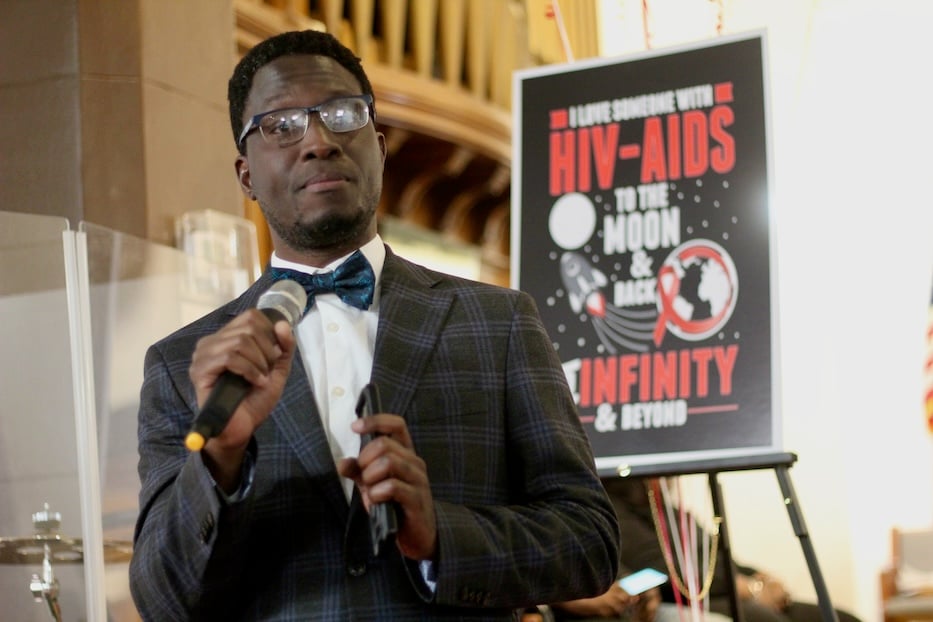
Dr. Onyema Obuagu.
Looking out over the pews, he encouraged people to become messengers in their own communities, with a gospel of public health that is as dear to them as the word they bring home from church each week. That includes talking to children, teens, young adults, peers and elders alike about sex, sexual health, protection and prevention.
For instance, he said, most people don't know that they have options like PrEP (pre-exposure prophylaxis) and PEP (post-exposure prophylaxis), as well as an antiretroviral injectable that they can take every two months. Or they're unaware that HIV testing options are available over the counter, through a simple saliva self-test.
"My people, my friends, my brothers and sisters, it's time for us to get that message out," he said. "HIV is real. … [and] you can easily lose progress gained when you don't sustain the efforts that you have. We have the tools, but when you don't use them right or we relax, there's a risk that we can have a rebound or lose the gains that we've had, and that's going to really be disastrous for our community."
"I believe that stigma flies in the face of everything that God taught us to do," he added. "God bless you guys."
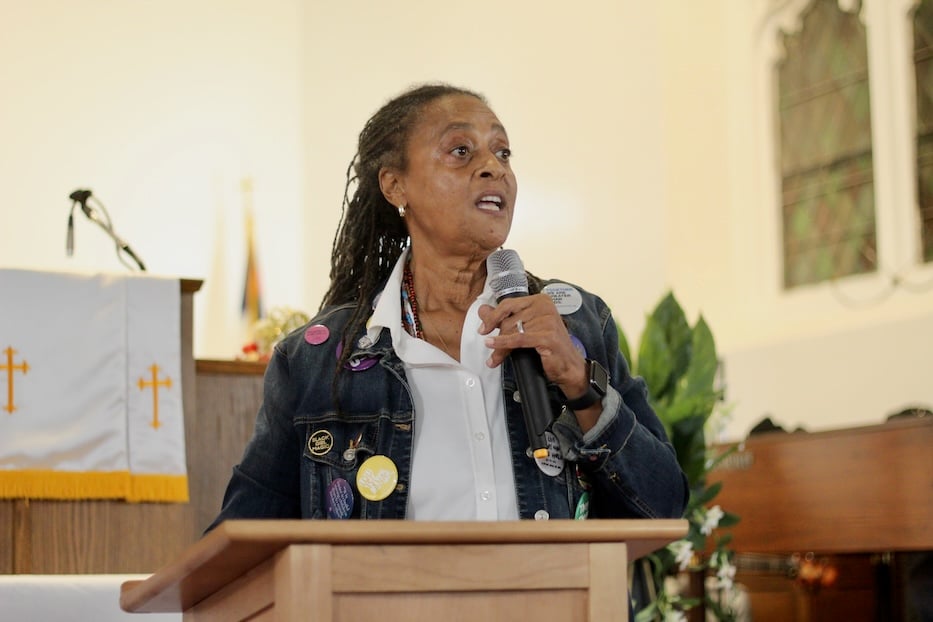
HIV/AIDS advocate and organizer Gloria Searson.
That message echoed as HIV/AIDS advocate and organizer Gloria Searson took the mic to talk about her own experience living with HIV. The founder of Coalition On Positive Health Empowerment (COPE), Searson took attendees back to 1991, when she was a 30-year-old mom of two, newly divorced and newly diagnosed with HIV. As soon as she received the news, she began learning everything she could about her diagnosis.
"The first thing I did was learn, what the heck is this thing, so that I could get love again," she said. "So that somebody could love me again, and that people wouldn't be afraid of me. I wanted to learn ... how can I prevent myself from dying prematurely from this?"
Searson started attending a support group, aware that she was the only Black person and the only woman present. Each Saturday for two years, she came to listen and collect information around the virus. She didn’t keep it to herself, she said. Instead, she began making fact sheets for people who looked like her—members of her community who were rarely represented as the face of HIV.
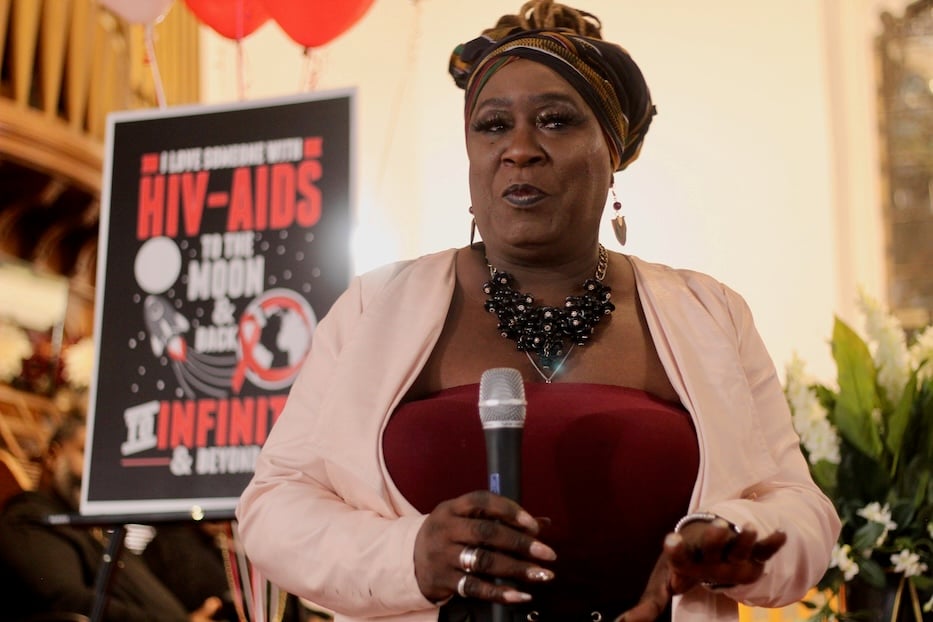
Nadine Ruff, once a client at AIDS Interfaith and now an intensive case manager at APNH, speaks about her work and resources in the community.
She also started taking care of her health, from getting enough sleep to monitoring what she put in her body. In her day job as a social worker, she opened up to clients about her own lived experience, to let them know that their HIV was not a death sentence. At home, she told her two young children about the virus, so that they knew what it was and how to protect themselves.
"I didn't feel like I was doomed to death, even though you heard that it [HIV] was about dying," she said. "This disease and the people who have this disease showed me what it is to live and to fight for life."
That approach continued to serve her years later, when she met the woman who would become her wife, the late Damaris Navarro Searson. The two were married for over three decades, in which they adopted two children and grew a life together, before Navarro Searson passed away in 2021.
"It made me a different person," she said of her diagnosis. "It made me appreciate the fact that I am not a Mack Truck. How many people here know how to take care of their bodies?"
"We gotta stop camouflaging the pain," she continued. "The pain is what keeps us not doing good things for ourselves. Try to feel that pain, and work through it, because on the other side is something so beautiful. "
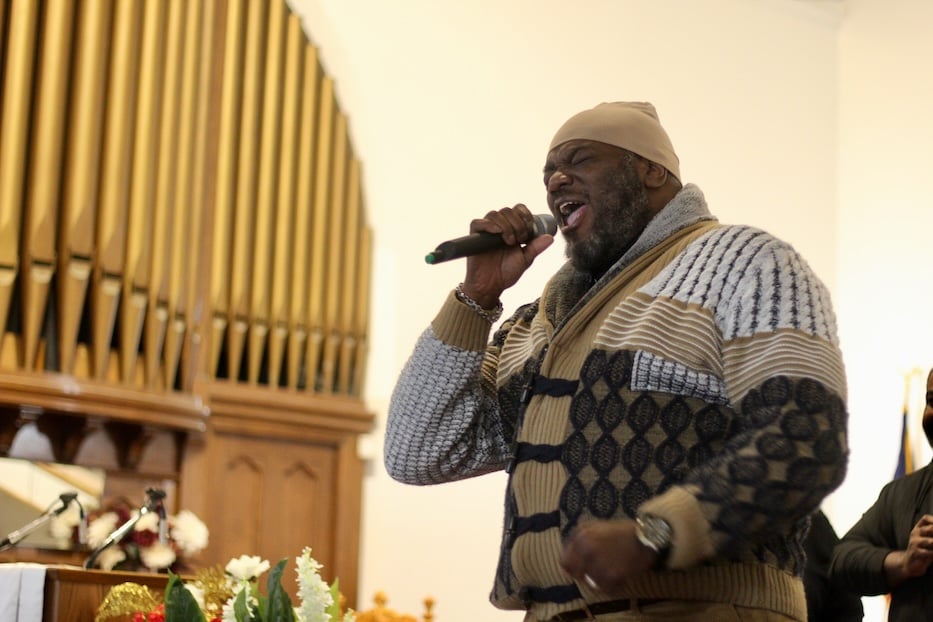
Musician Sean Gardner.
As Searson returned to a pew in the front of the church, musicians took up that message in song, with a selection of works that left attendees swaying in their pews, and sometimes breaking into tears as the words washed over them. Nowhere, perhaps, was that clearer than in an interlude from Denny, as he made Paul Simon’s “Bridge Over Troubled Water” entirely his own. In the quiet after the performance had ended, he said he was thrilled to participate and to help get the word out about HIV prevention.
“This is about being aware and assembling people through education,” he said.
That was also true for musician Sean Gardner, who is proud to call Daniels-Singleton his cousin. As a longtime member of St. Mary’s and a person who has watched HIV ravage families and friend groups in his own community, he stressed the importance of letting people know how to protect themselves, get tested and find the right antiretroviral therapies if they need them.
“I think that we need to keep the fires and embers burning,” he said. “We need to re-energize this movement and speak out to make sure that we don’t have another epidemic.”
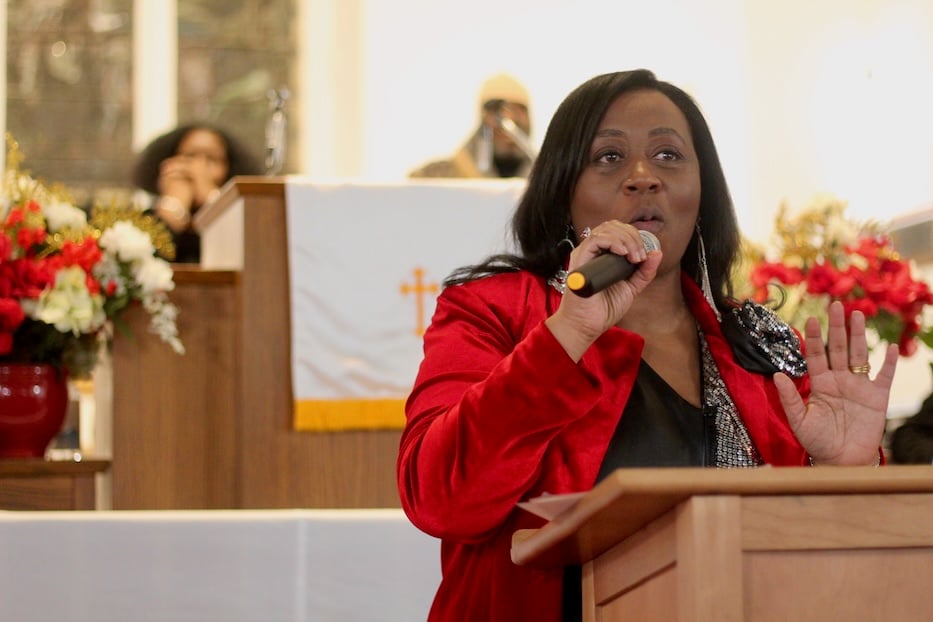
Andrea Daniels-Singleton.
As she thanked artists for their time, Daniels-Singleton said that she sees Saturday as just the beginning of a longer effort. The cause is close to her heart: In the early 2000s, she came onboard as a case manager for AIDS Interfaith, then a pioneering and singular organization in the field of AIDS awareness. At the time, her boss—the now-legendary Elsie Cofield—was one of the only faith leaders in New Haven willing to actively talk about prevention, support, and awareness. Daniels-Singleton has worked to carry on that legacy.
"HIV/AIDS was a subject that was rarely discussed because of the stigma and shame attached," she remembered. "It was often considered the nasty disease, which in many cases led to isolation from family and friends. Some people believe the disease is a punishment from God as a result of sexual sin. Many suffer in silence. I want to continue to promote love and hope through education and the arts."
That advocacy work intersects directly with her belief in a loving and forgiving God, who commands his followers to love their neighbors as they love themselves. As an active and lifelong member of St. Mary's—her aunt, Pastor Martha Green, founded the church 50 years ago—she's also seen firsthand how powerful the church can be in getting the word out about a public health crisis. That's where the idea of "The Healing Starts Here" came from, she said. Before the night was over, she urged fellow attendees to become public health messengers in their homes and churches, so that the night might have a ripple effect.
“It’s the huge component [that’s] missing,” she said. “The conversation must continue so that we all can heal, both infected and affected. This isn’t only a gay or African American disease, it’s a community epidemic. Education plus love equals success—the healing starts today!”
For more on A2A’s commemoration of World AIDS Day, listen to or download the above episode of WNHH Community Radio’s “Arts Respond.”

